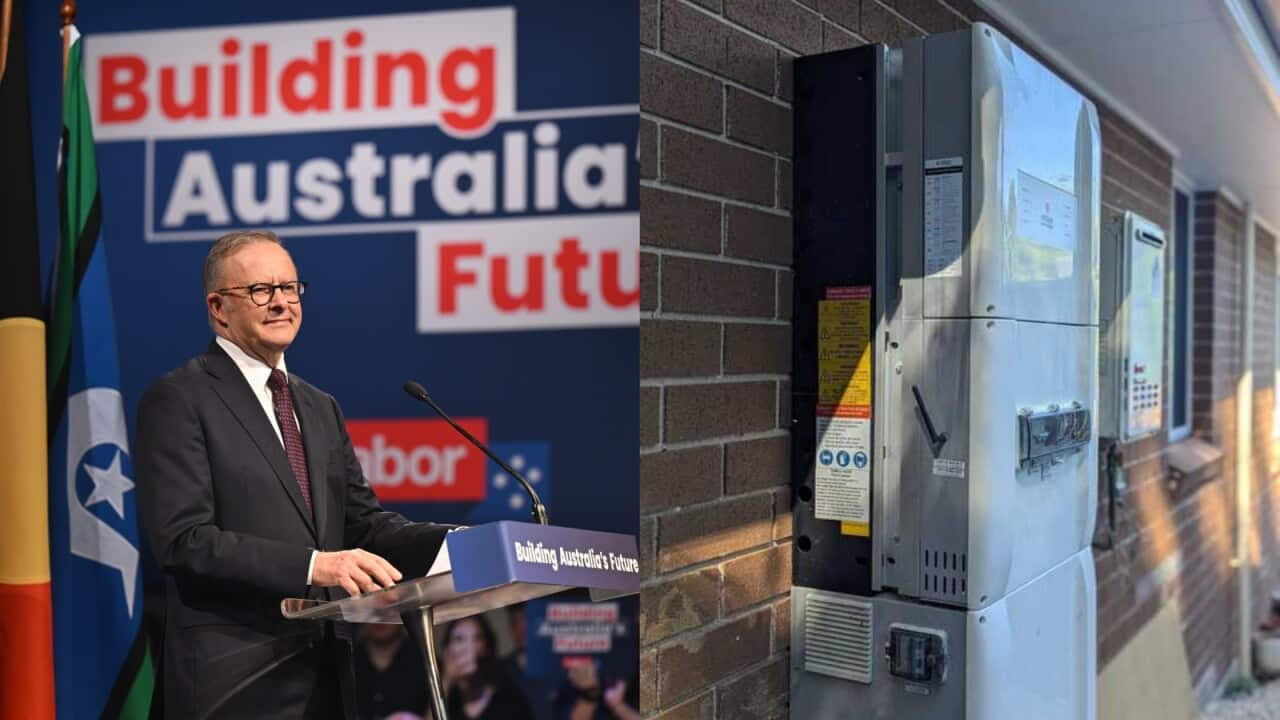Labor has promised to subsidise the cost of a solar power battery, which could save households thousands per year in energy bills.
would offer a 30 per cent discount to households and small businesses buying a typical battery — a saving of roughly $4,000.
Labor estimates millions of households could save between $1,100 and $2,300 each year on energy bills.
Here's what you need to know about the program.
How would the batteries reduce bills?
Households with solar power batteries can save money by reducing demand on the grid, energy finance analyst Jay Gordon told SBS News.
"Batteries can feed energy back into the grid during the evening peak time, and now that's the time where typically solar energy is declining, demand is growing and so we often fall back on really expensive sources of electricity like gas," said Gordon, who is from the Institute for Energy Economics and Financial Analysis.
"So the more you can feed back lower cost energy from batteries to that period, the more you can lower the overall cost of energy."
Where would the batteries come from?
Tim Buckley, a director at public interest think tank Climate Energy Finance, said around 60 per cent of battery cells and parts are made in China.
He told SBS News that once parts are imported from China, Australian manufacturers assemble the batteries.
"If we increase installs by 300, 400, or even 500 per cent, and then this policy stays in place out to 2030, then there absolutely is every probability that Australian suppliers are going to step up and be more a part of the process," he said.
Are solar batteries safe?
There have been cases of , but Buckley said good quality products installed by a certified electrician would be safe to use.
"The risks are relatively minor; any electrical product can have a fire if there's a malfunction," he said.
"It's important to not conflate fires caused by low-quality electric scooters with good quality household batteries."
What about renters and apartments?
The rebate would only apply to people with rooftop solar, meaning people living in an apartment and renters could miss out.
Buckley said he would like to see this revised and caveats put in place for apartment blocks, so that those households aren't left behind.
"I would hope this is just the next iteration of a number of policies to make sure we deal with apartment dwellers," he said.
"There could be split incentives for renters and landlords, and policies to deal with council regulations and strata titles."
Are the batteries sustainable?
Gordon explained that the batteries can create emissions when manufactured, but would result in lower emissions overall compared to gas.
He said swapping to solar power batteries would shift energy consumption to zero carbon emissions.
"If you consider that often for a household appliance, the life cycle of that appliance is something like 15 to 20 years, so solar really makes a significant reduction in emissions," he said.
How long could it take to roll out?
The program will be up and running from 1 July 2025 if Labor win the election. But how long it could take households to receive a battery and see financial benefits depends on other factors.
Gordon said that though the popularity of such a scheme is hard to predict, current programs like the small-scale renewable energy scheme — which the battery subsidy would be rolled out through — have been "extremely successful" at driving up rooftop solar uptake.
"I think it's feasible to expect we could see significant numbers of batteries being installed."



